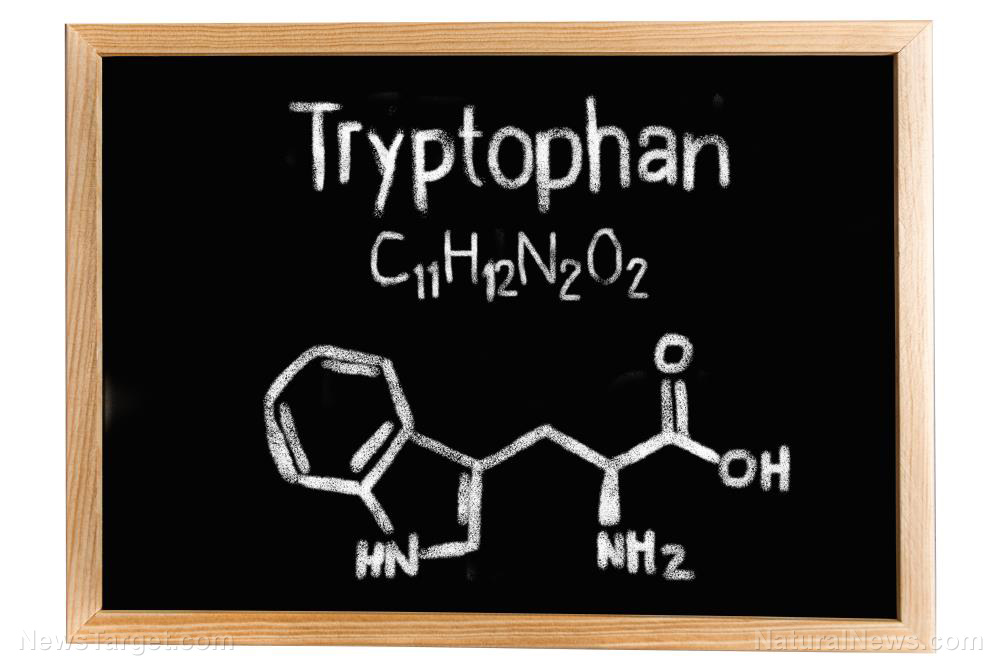Tryptophan found to be necessary for better mental health
12/07/2018 / By Edsel Cook

Your brain relies on serotonin for some of its most important mental functions. An article in Be Brain Fit stated that this important neurotransmitter is synthesized from tryptophan, one of the most misunderstood and important of all amino acids.
Many mental issues have been attributed to low levels of serotonin. Anxiety, depression, and loss of memory are only some of the associated health problems.
Antidepressant drugs called selective serotonin reuptake inhibitors (SSRI) stimulate certain parts of the brain to increase the amount of serotonin at hand. However, the better and natural way to improve serotonin levels is to increase the amount of tryptophan present in your body.
The more of this essential amino acid that is present, the higher the serotonin levels will be. Tryptophan can therefore improve moods, reduce anxiety, enhance both long- and short-term memory, and relieve the symptoms of premenstrual syndrome. In addition to serving as the building block of serotonin, tryptophan is also used to make the sleep hormone melatonin. So it can also improve sleeping disorders even as it amends the symptoms of multiple mental disorders. (Related: An evidence-based guide to brain foods that improve memory and focus.)
The best way to raise tryptophan and serotonin levels
You can boost your tryptophan levels in two ways: One is to eat the appropriate foods, the other is to take health supplements.
Animal products are the best natural sources of tryptophan. These include dairy, eggs, meat, poultry, and seafood such as tuna. These foods also happen to be rich in protein. Large amounts of protein prevent tryptophan from getting converted into serotonin. Other factors that reduce the synthesis of serotonin include artificial sweeteners, insulin resistance, a lack of magnesium, high levels of stress, and old age.
You can improve the production of serotonin by skipping protein-rich foods during some meals. This allows your brain to absorb tryptophan at a better rate. You can also eat foods that are rich in tryptophan but have little protein. Asparagus, cauliflower, green leafy vegetables, sesame seeds, oatmeal, soybeans, and sunflower seeds not only have plenty of the essential amino acid, they also provide other important nutritional benefits.
Finally, you can take it as a supplement. Available in capsule and bulk powder forms, tryptophan supplements contain a much higher concentration of it compared to foods. The recommended dosage may vary. But a daily dose of 500 milligrams is considered to be a good start in supplementation.
Safety reminders regarding tryptophan supplementation
Tryptophan is considered to be very safe. However, it does have some side effects. Users have reported decreased appetites, headaches, sleepiness, and upset digestions.
Women are not recommended to take supplements if they are pregnant or breastfeeding. Tryptophan has not been confirmed to be appropriate for them during these sensitive times. Furthermore, tryptophan and SSRI drugs must not be taken together. Both of them raise serotonin levels, so combining them can result in excessive amounts of the neurotransmitter. This leads to serotonin syndrome, a dangerous condition that can lead to death.
If you are taking 5-HTP supplements, you may want to switch to tryptophan instead. Both treatments raise serotonin levels, but tryptophan has several advantages over its counterpart.
Tryptophan is much more easily absorbed by the brain. Meanwhile, 5-HTP achieves its serotonin-boosting effect by decreasing the other important neurotransmitters in the brain. So you will be losing out on dopamine, epinephrine, and norepinephrine if you take the latter, which is why it is only for short term use. In comparison, tryptophan does not alter the levels of the other neurotransmitters. It can be taken for much longer periods without suffering a drop in its effectiveness.
Find out more about the benefits of amino acids at Nutrients.news.
Sources include:
Tagged Under: 5-HTP, Amino Acids, food is medicine, how to boost serotonin, melatonin, Mental Disorders, mental health, mind body science, natural remedies, nutrients, prevention, selective serotonin reuptake inhibitors, serotonin, supplementation, tryptophan
RECENT NEWS & ARTICLES
COPYRIGHT © 2017 BRAIN NEWS


















